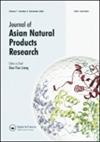作为体内模型筛选天然植物提取的新型抗衰老化合物的草履虫:简短介绍。
IF 1.3
3区 医学
Q3 CHEMISTRY, APPLIED
引用次数: 0
摘要
全球人口老龄化凸显了对有效抗衰老疗法的需求。天然产品大有可为,但由于衰老的复杂性,彻底评估需要体内模型。出于伦理方面的考虑,人们正在从兔子和小鼠等传统模型向 elegans 线虫等替代模型转变。这种微小的线虫生命周期短,基因与人类相似,成本效益高,是测试抗衰老化合物的理想选择。我们回顾了利用秀丽隐杆线虫评估天然产品的研究,认为它可以作为评估植物抗衰老化合物安全性和有效性的主要模型。本文章由计算机程序翻译,如有差异,请以英文原文为准。
Caenorhabditis elegans as in vivo model for the screening of natural plants-derived novel anti-aging compounds: a short introduction
The global aging population highlights the need for effective anti-aging treatments. Natural products show promise, but thorough evaluation requires in vivo models due to the complexity of aging. Ethical concerns are driving a shift from traditional models like rabbits and mice to alternatives such as Caenorhabditis elegans. This microscopic nematode, with its short life cycle, genetic similarities to humans, and cost-effectiveness, is ideal for testing anti-aging compounds. We review studies using C. elegans to assess natural products, suggesting it could serve as a primary model for evaluating the safety and efficacy of plant-derived anti-aging compounds.
求助全文
通过发布文献求助,成功后即可免费获取论文全文。
去求助
来源期刊
CiteScore
3.20
自引率
5.90%
发文量
47
审稿时长
2.3 months
期刊介绍:
The Journal of Asian Natural Products Research (JANPR) publishes chemical and pharmaceutical studies in the English language in the field of natural product research on Asian ethnic medicine. The journal publishes work from scientists in Asian countries, e.g. China, Japan, Korea and India, including contributions from other countries concerning natural products of Asia. The journal is chemistry-orientated. Major fields covered are: isolation and structural elucidation of natural constituents (including those for non-medical uses), synthesis and transformation (including biosynthesis and biotransformation) of natural products, pharmacognosy, and allied topics. Biological evaluation of crude extracts are acceptable only as supporting data for pure isolates with well-characterized structures.
All published research articles in this journal have undergone rigorous peer review, based on initial editor screening and anonymized refereeing by at least two expert referees.

 求助内容:
求助内容: 应助结果提醒方式:
应助结果提醒方式:


